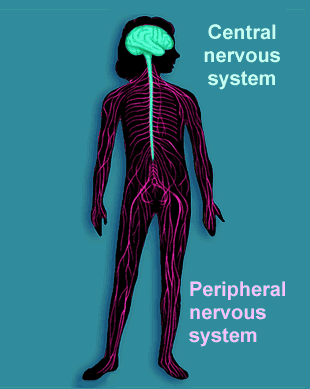|
The nervous system is made up of all the nerve cells in your body.
People communicate through their nervous systems, consciously and subconsciously.
The nervous system is responsible for our speech and movements
as well as sending signals throughout the body that send information to your muscles and organs.
The main organs in the nervous system are the brain, spinal cord, and sensory nerves. There are billions of nerve cells in the human body. These cells, called neurons, communicate within the body through electrochemical signals. There are three classes of neurons: Afferent (sensory) neurons, which send signals regarding the five senses, efferent (motor) neurons, which transmit signals to the muscles and glands, and interneurons, which integrate information from the afferent and efferent neurons. The nervous system must be preserved because once nerves are damaged, they cannot come back. Serious damage can be done to the body without nerves, such as someone not being able to feel something hot and destroying their skin-- and that would only be damage to sensory nerves. Damaging the spinal cord and/or brain could lead to paralysis of the mind or body, and ultimately, death. |
 |